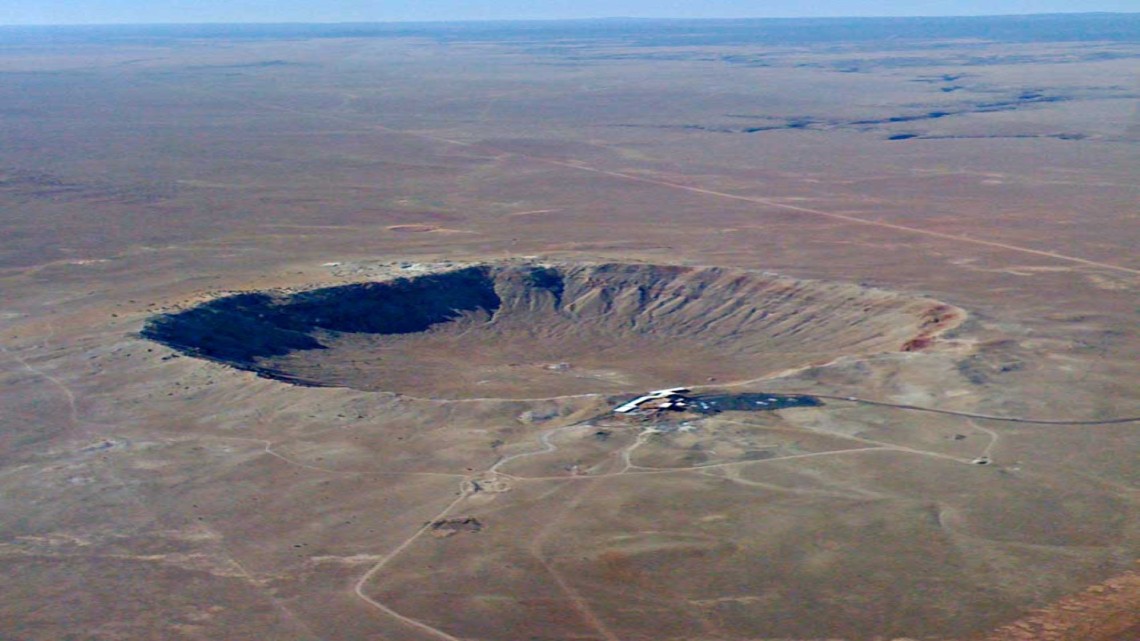
The famed Barringer Meteor Crater in the desert in northern Arizona. Two students affiliated with the Cornell Jeb E. Brooks School of Public Policy's Tech Policy Institute will analyze public opinion on how governments should respond when asteroids and comets threaten the earth.
News directly from Cornell's colleges and centers
Student team will seek public’s views on planetary defense
By Jim Hanchett
Two students directed by government professor Sarah Kreps will conduct public opinion surveys on planetary defense – how governments respond when asteroids and comets threaten cities, countries, or at the extreme, even the entire earth.
The team has been awarded a research grant by the International Academy of Astronautics, a United Nations-recognized non-governmental organization based in Sweden. Through student-devised research, the Academy seeks to enhance global understanding of the risks posed by asteroids and comets as well as potential mitigation measures that could protect the planet.
“While public opinion on planetary defense may seem obvious – who wouldn’t be in favor? – we expect to see more divisions over how governments should respond and whether they should act individually or work together to avoid disaster,” Kreps said.
Kreps is the John L. Wetherill Professor of Government in the College of Arts and Sciences and a professor in the Cornell Jeb E. Brooks School of Public Policy. She is the inaugural director of the new Brooks School Tech Policy Institute and will supervise PhD students Avishai Melamed and Adi Rao, both in the field of government.
The team will conduct surveys to answer several key questions:
- What is the public’s understanding and opinion of planetary defense?
- What information increases or decreases support for planetary defense?
- How would the public comparatively support various components of, and different approaches to, planetary defense?
The project is one of the first to assess opinions on planetary defense and their goal is to provide policymakers with useful data by the end of this year. The timing of future collisions is unknown, but the threat remains plausible, and indeed an impact from asteroid 2022 EB5 occurred over the Norwegian Sea during the grant application process.
Should a direct hit loom, mitigation can take several forms. With enough lead time, some scientists are confident they can develop technologies that could deflect a large asteroid off a calamitous trajectory. In the absence of sufficient opportunity to react, the last resort is to move people and infrastructure out of the target zone.
“The public may have strong preferences for what form of planetary defense they prefer. It’s possible that one country’s population may support a method reliant on international cooperation,” Melamed said. “Another country’s citizens could be hesitant for their homeland to share newly developed technologies and thus prefer to conduct their defense unilaterally. We want to identify such views now when there is no scramble to plan and prepare.”
The researchers are particularly interested in discerning what arguments affect support for funding planetary defense. “We also want to see the effect of externalities in disaster prevention on support for such policies,” Rao added. “Politicians and their constituencies alike often keep certain facilities operating despite proposals to retire them because of the redistributive boons to the community. Planetary defense may accrue support simply on the basis of its investment into the space sector writ large. Security issues aren’t simply about security–they’re also about redistribution.”
Media Contact
Get Cornell news delivered right to your inbox.
Subscribe
